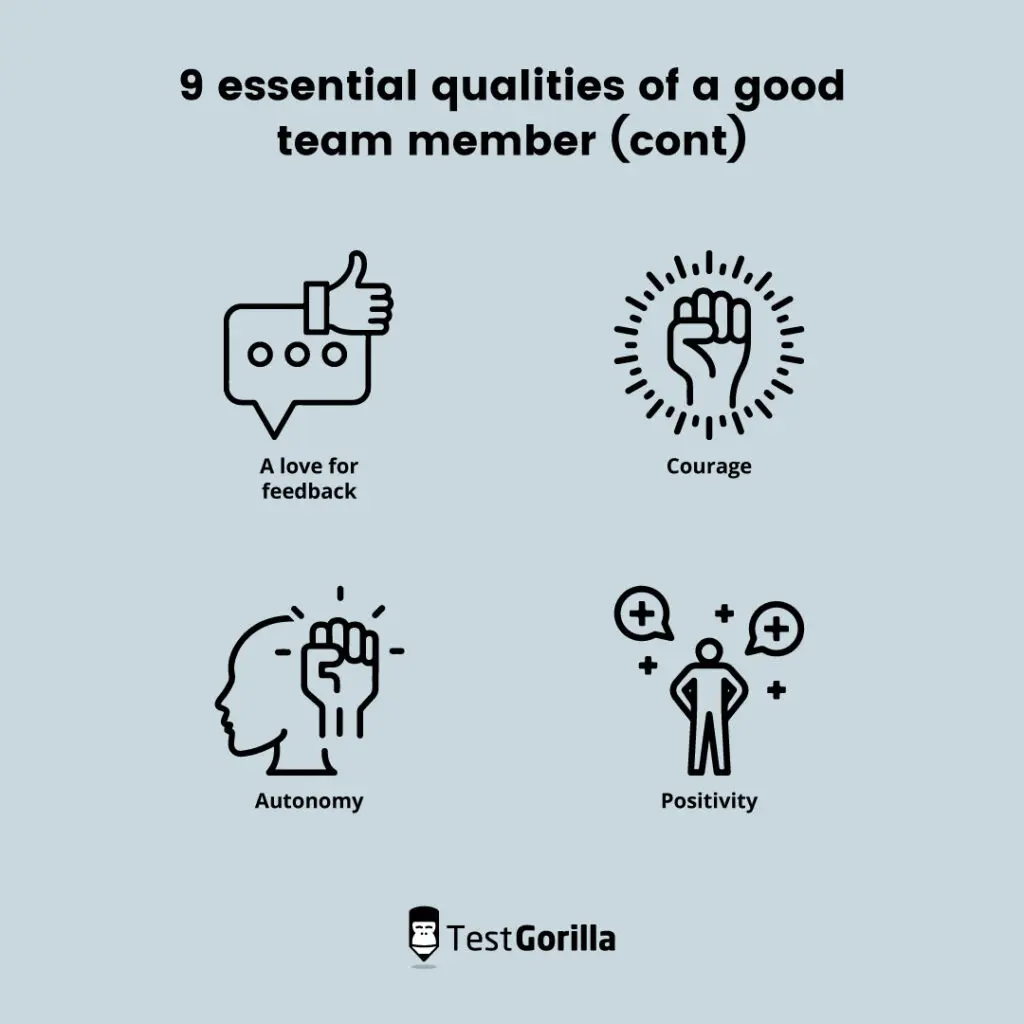Every company aims to thrive in the marketplace. And to do so, they need great employees who push the organization forward. But what makes an excellent employee in today’s business world?
Today, many employees across industries work in teams, whether in the office or remotely. Therefore, they must have traits that enable them to co-operate and complete tasks effectively as a team. But what are the qualities that make a good team player?
This article will help you build a team that excels by explaining what it means to be a team player, the qualities of a good team member, and how to nudge someone to be a better team player.
Table of contents
What does it mean to be a good team player in today’s work environment?
Employees are collaborating more than ever. Most companies have abandoned the silo approach in business and share a lot of information across teams and the entire organization.
Since team members need to collaborate with others on projects, they must be good team players to achieve the company’s goals. The following nine qualities and characteristics make any employee a great team player.
9 essential qualities of a good team member
These characteristics will make an employee a great team member, regardless of the industry they work in.
1. Emotional intelligence
The first in our list of qualities of a good team member is emotional intelligence. The ability to understand and manage one’s own emotions and those of others is indispensable in the workplace.
Some employees work from the office, others work from home, and some work under a hybrid model. Further, the workforce is no longer local but global. This means that employees often must communicate with people in different locations – even those who live in different parts of the world and in different cultures.
This means that team members need a high level of emotional intelligence and the ability to effectively support, empathize with, and actively listen to their colleagues.
2. Communication skills
A great team member is a good communicator. This doesn’t necessarily mean they’re talkative but rather that they know how to communicate with others effectively.
This means that they can listen to co-workers attentively, apply emotional intelligence, and read between the lines. On top of that, they know how to structure their own thoughts and share them with other employees clearly and concisely.
Good team members know how to communicate verbally during meetings and through writing when sending emails, memos, or other messages to their peers and managers.
3. A strong commitment to goals – but flexibility in their approach
Former US president Dwight D. Eisenhower is quoted as saying that “plans are useless, but planning is indispensable.” What he meant is that the process of planning is essential, but the plan itself will often need to be changed when confronting with the reality of the situation.
One of the critical qualities of a good team member is the ability to plan things out and determine the direction the team is heading. Employees should do this not only on an individual level but also on a team level with their manager and other team members.
They must also be aware that the plan will likely change because it’s impossible to take into account every contingency ahead of time. However, this won’t dissuade them from achieving their goal, though they may need to be flexible in how they carry out their plan.
This will signal to the others on the team that they’re dependable and can pull their weight.
4. Accountability and responsibility
Great team members take accountability and responsibility for their own work and that of the entire team.
A team functions as a single unit, and every member must pull their weight. Only that way can they create trust with each other and function in unison.
5. A learning mentality
Because our world is changing so quickly, the half-life of a skill is around four years, which means that it depreciates in value by half in only four years. This makes continuous learning vital in the workplace.
So a great team member must always have a beginner’s mindset, no matter how proficient they are in their area of expertise. They need to approach situations with an open mind and identify opportunities to grow – there’s always something new to learn.
A growth mindset is especially important for senior team members, who can set an example for their less experienced colleagues in spite of already having a lot of knowledge and skills.
6. A love for feedback
Because of their learning mentality, team players also understand the importance of feedback. Feedback is a two-way street, and a characteristic of a great team member is that they love giving and receiving feedback.
Communication skills are crucial when giving feedback. A good team member structures their feedback to have a positive impact on the receiver. They also know how to use feedback-giving techniques like the BIO (behavior, impact, options) method to avoid creating unnecessary tension.
They actively seek and give feedback because they understand that it provides an opportunity to grow and learn personally and professionally.
7. Courage
“Courageous” is one of the best words to describe a good team member. Team members need to speak up to hold others accountable when the situation calls for it. This isn’t always easy, especially if they have a positive relationship with their co-workers.
When a team is cohesive and getting along, it can be challenging to “disturb” that atmosphere by pointing out negative aspects, unreached goals, or problems.
But team players know that sometimes they need to put their personal relationship aside and step up when necessary. Great team members have the courage to stand up and point out the elephant in the room.
8. Autonomy
A great team member works together with others to achieve goals and objectives. At the same time, they can complete their own work independently and pull their weight to successfully accomplish their individual goals.
9. Positivity
Last but not least, team members need positivity.
They should have a positive outlook no matter what problems the team faces. Their optimistic attitude will help their colleagues overcome even the most challenging situations.
Team members shouldn’t ignore problems but rather acknowledge them and look for solutions. They need to provide encouragement and stay positive for not only themselves but also their co-workers.
Here’s how to nudge someone to become a better team member
A team member who has the above-mentioned nine qualities is an ideal addition to any team. Best of all, they can lead by example, influencing others to improve their teamwork skills.
They don’t have to be the team’s manager; they just need to embody the right characteristics, and others will notice and try to emulate those qualities.
There are also ways you can nudge your team members to improve.
One of the easiest methods is to give your employees assessment tests. For example, if you want your team members to become better at communicating, you can start by giving them a Communication skills test to determine their current level.
Then, you can share the test results with your team members to pinpoint bottlenecks and problems. Based on their results, you can create tailored training sessions to help each employee develop the qualities of a good team member.
Assess your employees’ teamwork skills with TestGorilla
Today’s workplace requires employees to be good team players. They’re constantly working alongside not only their team members but also other teams across the organization. As a hiring manager, you want to support your employees to become the best team members they can be.
You can achieve this by using TestGorilla’s scientifically created tests to evaluate your employees’ current abilities and develop teamwork training programs.
So don’t wait – book a free demo call with us to discuss your specific business needs
Related posts
Hire the best candidates with TestGorilla
Create pre-employment assessments in minutes to screen candidates, save time, and hire the best talent.
Latest posts
The best advice in pre-employment testing, in your inbox.
No spam. Unsubscribe at any time.

Hire the best. No bias. No stress.
Our screening tests identify the best candidates and make your hiring decisions faster, easier, and bias-free.
Free resources
This checklist covers key features you should look for when choosing a skills testing platform
This resource will help you develop an onboarding checklist for new hires.
How to assess your candidates' attention to detail.
Learn how to get human resources certified through HRCI or SHRM.
Learn how you can improve the level of talent at your company.
Learn how CapitalT reduced hiring bias with online skills assessments.
Learn how to make the resume process more efficient and more effective.
Improve your hiring strategy with these 7 critical recruitment metrics.
Learn how Sukhi decreased time spent reviewing resumes by 83%!
Hire more efficiently with these hacks that 99% of recruiters aren't using.
Make a business case for diversity and inclusion initiatives with this data.



















